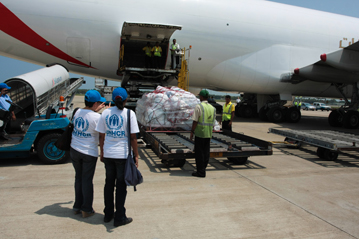Somali refugees ponder future as neighbours go home
Somali refugees ponder future as neighbours go home

AISHA REFUGEE CAMP, Ethiopia, March 16 (UNHCR) - Eleven years into his exile in Ethiopia, Mogadishu native Ali Abdi succumbed to unbearable homesickness and got up his nerve to go on a reconnaissance mission back to the violent Somali capital.
Even now, four years later, the memory of the shock that awaited him moves him to tears. "When I got to Mogadishu, I found all my relatives were dead. There was not a soul alive," says the 50-year-old father of four, stumbling from the room in the midst of his tale.
It's an all-too-common story from a country that dissolved into chaos in the late 1980s, but now Ali has extra cause for tears. He spends much of his time these days saying goodbye to the Somaliland neighbours he has lived with for the past 14 years, as Aisha refugee camp empties out.
The remaining few thousand Somaliland refugees - who originally fled Somalia's civil war in 1989 and 1990 - are going home from Aisha in the next two months. That will bring to over 1 million the number of Somali refugees who have returned home from exile, half of them with assistance from the UN refugee agency.
With their departure, UNHCR's operation in eastern Ethiopia - once one of the largest refugee-hosting areas in the world, with some 628,000 Somali refugees in eight camps - comes closer to winding down. Aisha camp is scheduled to close by the middle of this year.
Ali Abdi is among about 70 residents of Aisha who will be moved to Kebribeyah camp, the last camp in eastern Ethiopia, to join some 10,000 other refugees from central and southern Somalia who cannot go home because of continuing lawlessness there.
"I do not have any incentive to go back to Mogadishu, where I have no one to count on," he says in a shaky voice. He's now uncertain what the future holds for him.
Years of living side by side in the refugee camp have turned members of formerly rival factions into close friends. For the Somalis who must continue to live in exile, it's discouraging to see so many refugees returning to the self-declared independent (but unrecognized) state of Somaliland in north-west Somalia, where relative stability reigns.
"With my neighbours - who have been here with me for over 10 years - going home, I'm emotionally disturbed to be left behind," says 55-year-old Abdi Ali (no relation to Ali Abdi). "I want to return [to southern Somalia] immediately."
UNHCR assists the small number of refugees who return to Mogadishu and other southern areas every year, even though the refugee agency does not encourage such returns. Even in safer parts of the county, returnees face a difficult struggle to rebuild their lives; nearly half of Somalia's residents live on less than US$1 a day.
Ollow Mohammed is another man who is sick of having been a refugee for the past 14 years. "No matter how high the risks might be, I would like to go back to Mogadishu and not to Kebribeyah [camp]," says the 45-year-old schoolteacher and father of eight, six of whom are here in Aisha with him.
The recent establishment of a transitional national government for Somalia raises his hopes "that the new government will restore law and order" and make even Mogadishu safe for return, he says.
But in any case, he brushes off safety concerns about the Somali capital with the fatalism of Islam. "I'll die one day anyway," he says. "If it is the will of God, I can die even in a peaceful environment."
By Kisut Gebre Egziabher in Aisha camp, Ethiopia









